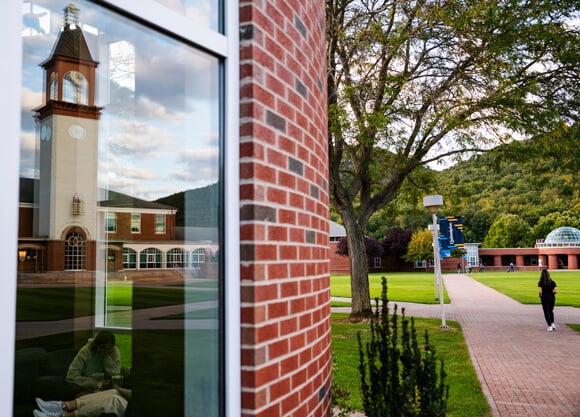
Quinnipiac recognized as a leader for using data to support student success
September 15, 2023

September 15, 2023

While it was McConnell’s first visit to Quinnipiac, she said she is very familiar with the innovative work led by Michael Ben-Avie, senior director of learning assessment and research in the office of academic innovation and effectiveness.
“Quinnipiac has been a long-standing collaborator with my organization, stemming from the work of Michael Ben-Avie and his office around assessment using some of our tools and our protocols – and it has blossomed,” said McConnell. “The way that the team here is using them is incredibly powerful, because they have connections back to the actual changes in the classroom, down to the assignment level.”
Quinnipiac’s longitudinal assessment studies employ predictive modeling and follow individual students and subgroups from orientation through graduation to determine the extent to which they are thriving on campus.
Predictive outcomes can inform faculty and learning centers in present time to help develop individual student goals to achieve desired futures. As a result, students are experiencing exceptional gains from the benefit of a Quinnipiac education, she said.
McConnell said Quinnipiac’s longitudinal analyses of student learning is rare among higher education institutions.
“An institutional approach that’s longitudinal is kind of the holy grail of assessment, and most folks aren’t there in their conceptions of the work. Michael and his team are executing it,” said McConnell.
Quinnipiac’s innovation in assessment and impactful integration of data to support student success has also drawn AAC&U to partner with the university on initiatives.
“What I find so rewarding about partnering with Quinnipiac is how meaningfully the actual student success data is integrated ¬– and then you have the wonderful partners in your teaching lab who translate it into transformative classroom experiences,” said McConnell. “Certainly, there are other institutions doing really good work in this space. Why I think Quinnipiac is an exemplar of this kind of work is that integration. It’s the ability to pull these pieces together to tell a coherent whole that I think can impact and make changes.”
McConnell said the aspirational, pioneering ethos which has attracted AAC&U to partner with Quinnipiac was evident during her campus visit.
“We have Quinnipiac partnering with us on several grant-funded initiatives where we’re able to say, ‘We know you’re doing this good work, what else are you willing to experiment with?’ There’s a bit of that experimental, entrepreneurial spirit, so to speak, that I certainly recognized around campus here today,” said McConnell. “Quinnipiac is willing to put up its hand, and try new things, and be one of the first out there saying, ‘Let’s experiment, and if it does well, or it does well by our students, it’s something we should be thinking about.’”
McConnell said she is also impressed with Quinnipiac’s training of students involved with assessment at the university.
Undergraduates working with Ben-Avie receive an academic year of training and are encouraged to creatively contribute their strengths and skills to the process. This approach to undergraduate research resonates with the types of enhanced educational experiences enumerated within AAC&U’s High-Impact Practices list, said McConnell.
Earlier this year, speaking at the plenary session of AAC&U’s 2023 conference on General Education, Pedagogy and Assessment, McConnell spotlighted Quinnipiac as a model of how to engage student workers within higher education institutions.
“Essentially what you have here in this office is two work-study positions that have been transformed. The quality of work and the quality of creative scholarship these students are engaging in is one-half internship and workforce preparation, another half undergraduate research and understanding the fundamentals of these methodologies. It is really robust and sophisticated. I think Quinnipiac could call this a model that others could follow, as well,” said McConnell.
Regarding Quinnipiac’s assessment and implementation practices, McConnell said the university’s collaborative work across many channels stands out.
“I’m often asked, ‘Can you give me a model for general education or give me a model of an institution that’s doing assessment well?’” said McConnell. “What I love about my job is that I get to say there are versions of models at any number of institutions. There are excellent pockets of practice at so many places. To me, there’s some convergence between multiple activities here at Quinnipiac that really raises it up a bit, so that it’s coordinated, it’s collaborative, it seems to bring out students’ sense of agency as they’re engaging in it. From what I’ve seen and what I hear, it is also engaging faculty.”
McConnell credits Quinnipiac with cultivating within faculty a sense of curiosity and passion around aspects impacting the student experience and learning environment, which is essential to the effective implementation of assessment outcomes.
“That culture building and that sensemaking, even before you get to a survey, or a rubric, or a methodology; that is critical to the success of any strategy you implement. And I think that’s something that’s palpable within the Quinnipiac experience,” McConnell said.
Quinnipiac Today is your source for what's happening throughout #BobcatNation. Sign up for our weekly email newsletter to be among the first to know about news, events and members of our Bobcat family who are making a positive difference in our world.
Sign Up Now